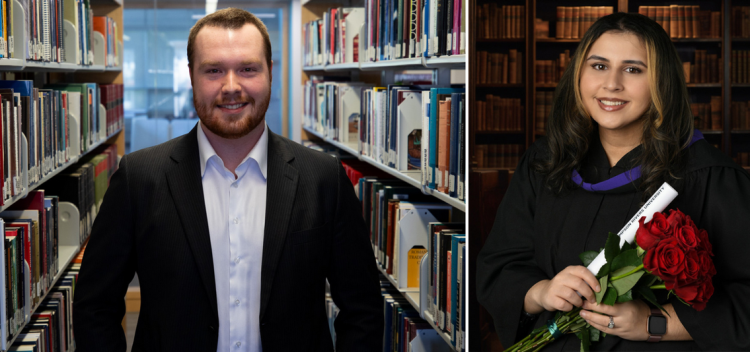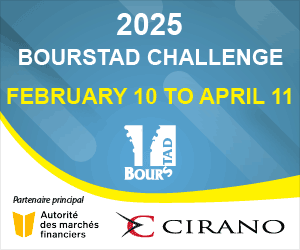Third-year student Luke Conkin's paper, titled The Truth Shall Set You Back a Fee - The Impacts of British Columbia's $10 Application Fee for Freedom of Information Requests, Two Years Later, explores how this recently introduced application fee has affected the flow of information from public bodies to those who request it.

Pictured left to right: TRU Law students Luke Conkin and Anisha Grewal
In 2021, B.C.'s Freedom of Information and Protection of Privacy Act (FOIPPA) was amended to allow a $10 application fee for non-personal freedom of information (FOI) requests (personal requests are still free).
Critics of the application fee worried it might reduce the number of FOI requests submitted in the province.
Conkin's research suggests they were right. In addition to reducing the number of FOI requests from individual requestors, political parties, academics and journalists, it also limited the scope of requests, as each department involved can charge the application fee.
"It was pretty hard to completely discount that these fees had some effect," he said.
Conkin initially completed the essay for his Civil Procedures class, then refined it for submission to the contest.
To analyze B.C's system, Conkin took a broader lens, using both qualitative and quantitative data to see how other jurisdictions, like the territories and neighbouring provinces, as well as the federal government, approach access to information.
While the introduction of an application fee did reduce the scope and amount of FOI requests, Conkin said B.C. is still a leader when it comes to access to information.
"That was a bit of a pleasant surprise seeing that even though this [fee] was a bit regressive in the aspect of access," he said. "But the actual services, the websites and other measures are at the forefront comparatively."
Conkin says the work was one of the most intensive research projects he's undertaken, which is saying something. Over the summer, Conkin joined the Investigative Journalism Foundation as a research and development associate. There, he and TRU classmate Ashley Desautels added about one million pages to Open by Default, Canada's largest database of publicly accessible government documents.
"There was definitely a lot of work involved in putting all those things together, but now people don't have to go through that whole process, they can just access it for free," he says. "I am really happy with the work we were able to do."
Conkin's paper impressed Faculty of Law Assistant Dean Desmond MacMillan.
"This accomplishment with the CBA is a testament to Luke's hard work and curiosity. His paper adds valuable insight to the discourse around access to information," he said. "I am looking forward to following Luke's career when he graduates from TRU."
Anisha Grewal, a 2024 law alum, took the top prize in the Aboriginal Law section's essay contest.
Her paper, titled Breaking Bread, Building Sovereignty: A Legal Analysis of the Journey to Indigenous Food Security and Self-Governance, examines food insecurity and an overall lack of food sovereignty among First Nation communities.
She became passionate about the topic after meeting her partner, Nate Dennis, five years ago. He is Wet'su'wet'en, and he and his family members are outspoken about various issues facing Indigenous people today, including food security and sovereignty.
"These interactions, spending time in Witset, and the fact that there are not many legal papers on Indigenous food security and sovereignty, motivated me to write this essay," she said. "Writing this paper enabled me to better understand and shine light on the unique experiences of Indigenous people across Canada from a legal perspective."
Grewal acknowledges there is still plenty of work to be done around First Nation governance and in pursuit of reconciliation.
Her work ethic was noted by Law Dean Daleen Millard.
"Anisha's outstanding achievement in the essay competition is a result of her dedication, creativity, and insightful analysis," she said. "I believe this is just the start of Anisha's amazing accomplishments as she will continue to push the boundaries of her knowledge and continue to inspire those around her."
The essay prizes each come with a $500 bursary. Conkin also received an invitation to the Canadian Bar Association's Privacy and Access Law Conference, which is being held in Ottawa Nov. 7-8.











